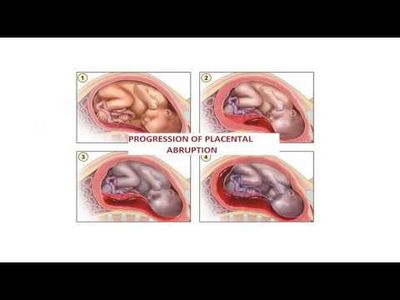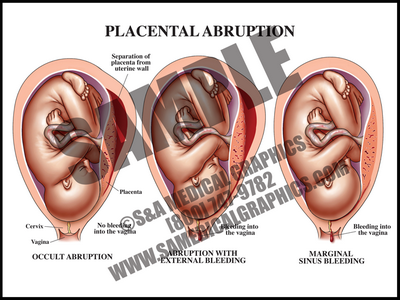A placental abruption occurs when a placenta or fetus attaches itself to the amniotic fluid that lines the womb and provides the infant with nutrients and essential oxygen.

Sometimes, placental abrasion can be triggered by an ectopic pregnancy, which occurs when a fertilized egg attaches itself to a fallopian tube instead of a normal egg.
Placental abrasion is typically caused by abruptio placentae, a common birth defect in which the amniotic fluid breaks off from the placenta before or during birth. Abruptio placentae are usually the result of a ruptured amniotic sac that either extends beyond the amniotic cord or forms a pouch on the side of the placenta. Placental abrasion is usually caused by an ectopic pregnancy, in which a small amount of the fertilized egg attaches itself to the lining of the fallopian tube before it attaches to the uterine wall.
Placental abrasion is a painful condition and can affect the life of an infant and his or her mother. Left untreated, placental abrasion can endanger both the infant and his or her mother. An umbilical cord blood bank may help babies whose mothers have this condition treated, as may the hospital that delivered them.
Babies that have been diagnosed with sudden placental abrasion often cry throughout the day. They may refuse to nurse for several weeks or become fussy and tired. They may also exhibit other signs such as low energy and irritability. Although they may be able to eat solids and feed themselves, they may lack enough calories and protein to meet their growing bodies.
Placental abrasion can cause a number of complications. It is more common in premature infants who have a shorter life expectancy. If left untreated, this condition can cause brain damage, nerve damage, heart problems, and difficulty breathing. Some infants may even require surgery.
Placental abrasion does not cause immediate complications if it is treated and prevented in its early stages. However, if placental abrasion is allowed to progress, some serious complications may arise, including:
Jaundice: The placental fluid will often leak from the placental cavity into the amniotic fluid, which is stored in the abdominal cavity.

This is a sign of jaundice, which is a condition where the skin of the newborn’s red blood cells become yellow or green in color due to an excess of bilirubin in the blood. As the bilirubin builds up, the fetus is unable to produce adequate amounts of bilirubin in the bloodstream and will be affected by jaundice. Jaundice will not develop until some time after delivery.
Placental amniotic fluid leaks can result in complications in pregnancy, even though they can occur when the placenta attaches to the uterine lining. These complications are more common in women who smoke. It is important to avoid smoking when an ectopic pregnancy is in progress or is causing placenta attachment.
Bleeding: Infants that have placental abrasion can sometimes suffer from bleeding. This usually happens when the placenta is pushed back into the uterus. This can occur at birth, if there is not enough amniotic fluid to prevent excessive leakage. Bleeding can occur after birth if the placenta becomes lodged in the amniotic sac. There can also be a delay in the occurrence of delivery if there is an obstruction in the fallopian tube.
Congenital Heart Defects: In babies that have placental abrasion, the heart valves can fail to close properly. If the valves do not close, the blood flow through the body may increase and cause congenital heart defects, including:
Poor Circulation: A lack of good circulation can lead to a baby having poor growth, slowed growth, poor digestion, and poor growth. Other complications can include:
Preeclampsia: Women who have placental abrasion are at risk of preterm labor if they choose to smoke or if they become pregnant before the placenta has fully detached. Uncomplicated placental abrasion does not always result in complications. However, if complications do occur, the mother should seek medical help right away to avoid further complications.